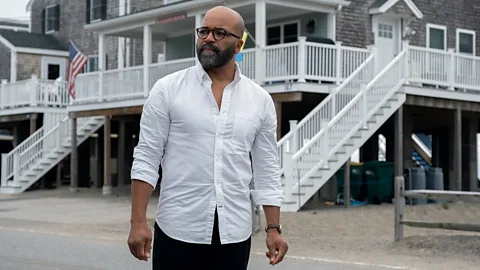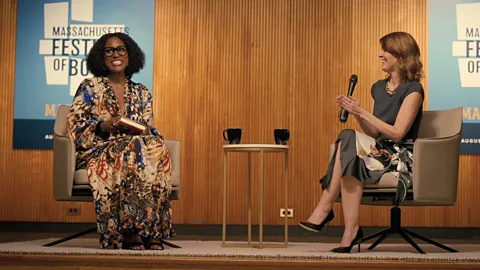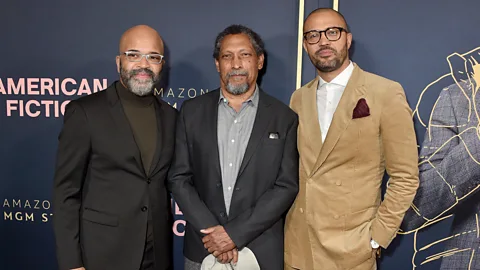American Fiction: The Oscar nominee wading into the US culture wars
 Orion Pictures
Orion PicturesOut of all the 2024 Oscar favourites, this stinging race satire starring Jeffrey Wright has the most to say about contemporary America – and has won fans across the political divide.
Ever since it won the People's Choice Award at the Toronto Film Festival in 2023, American Fiction has been embraced by audiences across the political divide. An adaptation of Percival Everett's 2001 novel Erasure, it tells the story of an erudite academic and author, Thelonious "Monk" Ellison (played by Jeffrey Wright), who inadvertently adopts a new writing persona to meet expectations of him as a "black author". It's a film that is a stinging satire of white liberals' tokenisation of black creatives in the publishing and entertainment industries. It's also a beautifully humane journey of grief, family and love that people of all backgrounds have fallen in love with.
More like this:
So far, writer-director Cord Jefferson has won several gongs this awards season, including the Bafta for best adapted screenplay, and the film has received five Oscar nominations including best actor for Wright, in his first lead role in a film since 1996's Basquiat. For a sharp contemporary comedy led by and made by black creatives – that isn't about slaves, maids or violent trauma – this sort of reception is a not-too-common occurrence. But it does join a long tradition of works grappling with race in modern America as it pertains to arts and commerce – from Robert Townsend's Hollywood Shuffle (1987) to Spike Lee's Bamboozled (2000) and Boots Riley's Sorry to Bother You (2018) on the big screen, to the Hulu series Woke (2020) and The Other Black Girl (2023) on TV.
 Orion Pictures
Orion PicturesAmerican Fiction "echoes this thread of discourse around black cultural production that has been ebbing and flowing and undulating for many years," Dr Michele Prettyman, assistant professor of Communication and Media Studies at Fordham University, tells BBC Culture. In doing so, she says, "it's emblematic of a profoundly creative impulse that we're seeing in black culture, in the US and globally; to me, that's part of the story."
The title American Fiction was partly inspired by Jefferson reading Langston Hughes' poem Let America Be America Again, he told the Script Apart podcast, while he also saw in it the potential for multiple interpretations. "There’s a good history of movies with America in the title," he said. "It’s a bookstore pun, a publishing pun, but underneath that, to me, race is this subject that is ripe for comedy and humour." And for Everett, a fiction in and of itself.
"Race is a bogus category, biologically," the author and distinguished professor of English at the University of Southern California tells BBC Culture. "Culturally, it's a construction that has affected everyone. The best we can do as human beings living with this construction that will not be abandoned is to make it fair and to understand that it's a shifting hierarchy of beliefs that are always imposed by an oppressor."
The dilemma of black artists
In Erasure and American Fiction's case, the main oppressor is white liberal publishers. In an early scene of the film, Wright's Ellison finds out his latest manuscript – an adaptation of Aeschylus' The Persians – has been passed on because it's not "black" enough. Monk is bemused; he sees himself as a writer who happens to be black, not a "black writer", à la the publishing industry's reductive labels. Monk is from a middle-class African-American family of doctors, and has enjoyed an intellectual, suburban upbringing and expensive education.
His cerebral works of fiction have found small readerships and he battles the sense that black writers should write about the so-called "authentic" black experience – the type of experience represented by the hit novel We's Lives in Da Ghetto, written in an urban vernacular and steeped in black pain, from the younger, but similarly privileged author Sintara Golden (played by Issa Rae). Monk cannot relate to such works and believes they conform to the worst kind of black stereotyping and tokenisation. "You know, I don't even really believe in race," Monk tells his agent Arthur over the phone as a cab driver ignores his hail. "Yeah," Arthur replies as Monk watches the cab stop for a white man instead. "The problem is, everyone else does."
It's a moment that hilariously encapsulates the particular conundrum faced by black artists navigating the creative industries, who face discrimination but don't want to be defined – and boxed in – by limiting, generalising stereotypes about the black experience, often encouraged by those purporting to promote "diversity and inclusion". For Everett, Monk is a character "alarmingly similar" to himself, and Erasure was his response to the wave of novels dealing with black trauma in the brutal bleak style of Richard Wright's 1940s classic Native Son and, more recently, Sapphire's Push. "Honestly I never had a problem with [these] books," he says. "The problem was that was all you got."
 Orion Pictures
Orion PicturesIn American Fiction, Monk adopts the pseudonym Stagg R Leigh to pen the black trauma novel parody, My Pafology, in protest. It becomes a bestseller to his intellectual chagrin but financial ease – he needs the money to cover his mother's medical bills as neither his book sales, as they stand, nor academic career provide enough income. Not least when a confrontation with a white student over the use of the N-word sees him "cancelled", with his white employers putting him on unpaid leave – a fictional tension that resonated for Josslyn Luckett, assistant professor of Cinema Studies at New York University. "I have been thinking a lot about how ironic it is that it feels more dangerous right now to be a black academic than it does to be a black person in Hollywood," she tells BBC Culture, citing a recent run of "censoring, firing and banning", that has affected black staff and students.
The examples she refers to include Florida's 2022 Stop W.O.K.E Act, signed by state governor Ron DeSantis, which determines how subjects like race and racism are discussed in schools and has left teachers concerned about what they can say in teaching students about their country's history; however, US district judge Mark E Walker issued a temporary injunction preventing the law from being enforced in higher education. In 2023, the College Board, a not-for-profit organisation that develops and administers standardised tests for further education, also drew criticism for omitting black authors like Angela Davis, bell hooks, and Ta-Nehisi Coates and subjects like intersectionality and the Black Lives Matter movement from the final draft of its curriculum for its new high-school Advanced Placement African American studies class.
The same year, the American Association of University Professors condemned Indiana University Northwest for firing a tenured black professor after making what the Association's report on the matter called an "implausible" claim of inciting anti-white violence. The US Supreme Court also recently ruled that race can no longer be considered as a factor in university admissions. "We're post-affirmative action so the future of black students is in jeopardy and the surveillance of black faculty is serious right now," believes Luckett.
'Woke' or 'anti-woke'?
American Fiction's commentary on both cancel culture and white liberal hypocrisy has seen it hailed by some for its "anti-woke" messaging: filmmaker Paul Schrader lauded it on his Facebook account "as a masterly combination of deadpan wit and anti-wokeness", while news outlets like the Daily Mail and The Times have embraced it as "the next evolution" of "anti-woke comedy." However, Everett objects to such readings of his story: "The Right will attempt to co-opt anything to discredit liberal thinkers," he says, arguing that the right-wing political sphere invented political correctness, and appropriated "wokeness", "as a way to discredit the idea of political fairness. The advantage that the Right has over the Left at any time is that they do not care about truth and reason. They care about slogans and they will glom on to a term and use it until it's meaningless."
Luckett similarly pushes back against what she believes is a misrepresentation of the film's core sentiment: "That's a narrow and limited misreading with a real agenda to it. I feel the film is saying there needs to be an expansiveness of black stories and black storytelling."
Jefferson has certainly succeeded in his intention to stir conversations. "I welcome debate," he told Variety. "I welcome discussion." However, while American Fiction may get involved in issues right at the heart of the US culture wars, both Luckett and Prettyman believe its appeal has more to do with its familial warmth than satirical bite.
Monk's family crisis involves the death of his sister Lisa (Tracee Ellis Ross), the ailment of his mother (Leslie Uggams) and the struggles of his newly out-the-closet brother Cliff (Sterling K Brown). "What we see is a story about a black family going through loss, dealing with grief, middle-aged people taking care of their elderly parents, all of these accessible, universal things that audiences of all backgrounds have to deal with," says Luckett. Yet there's also joy, mostly presented through the family's housekeeper Lorraine (Myra Lucretia Taylor) and her sweet romance with old acquaintance Maynard (Raymond Anthony Thomas). The character adds to the film's commentary about class differences within the African-American community, and also subverts the problematic mammy/maid trope of cinema's past, giving it a "three-dimensional" rewrite, says Luckett: "She has a life that gets celebrated and that's just so pleasing."
 Getty Images
Getty ImagesFor Prettyman, what makes American Fiction stand out from other satires about race like Lee's Bamboozled and Passing Strange and Ernest Dickerson's Good Fences is the warmth and care delivered by Jefferson and his cast. "Jefferson is wise enough to know that even as you deconstruct the [publishing] industry, and you're thinking about how culture gets mitigated and mediated and ignored, the human story is more compelling," she says. "There's something about [the story of] Lorraine and Maynard that is equally as valuable [as the film's] critique."
Still, the limitations of the film's critique might have contributed significantly to its celebratory reception. Jefferson chooses to poke fun at the rigged system rather than have his characters dismantle it, and some have suggested the film absolves the white gatekeepers it mocks from making meaningful changes. "[American Fiction] is a pithy, self-aware and hypercritical satire about how mainstream (read: white) media favours racial stereotypes in storytelling over any other portrayals of blackness," writes Huffington Post's Candice Frederick. "It does this, though, by also becoming the very thing it excoriates: a soulless story that is entertaining just enough for white people to be in on the joke."
Everett was certainly discouraged when his book received a similarly cheery reception. "I remember feeling somewhat dismayed that everyone was simply agreeing with it instead of getting upset," he explains. "It was an easy bandwagon to jump on because it wasn't moving." American Fiction's success has certainly got more eyes on Everett's work – "I never would have reached this many people and that's great," he says – but whether the publishing and entertainment industries are truly taking on board the points he was making, more than 20 years on from Erasure's publication, is another matter. "There are a lot more opportunities for writers of colour than there were but at the same time, there's also a lot more stereotyping in much of the popular media," says Everett. "So if there's more of both, is it any better?"
If you liked this story, sign up for The Essential List newsletter – a handpicked selection of features, videos and can't-miss news delivered to your inbox every Friday.
